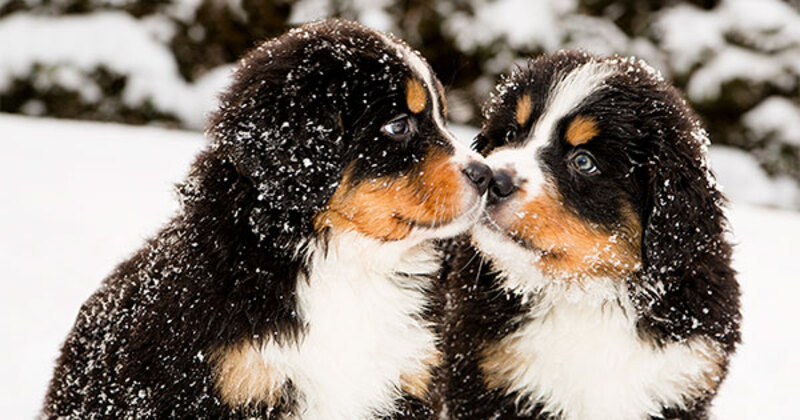The veterinary profession generally prides itself on being objective and scientific: we offer rational advice. So where do we stand on tips for pets in winter? Woolly jumpers and hats for cats? Warm boots for dogs? Heated beds for pets that spend time outdoors? How much of this is sensible, and how much is pandering to humanising and mollycoddling pets?
Dogs
Pet clothing
Big dogs, with long fur, don’t need extra insulation in cold weather: think of Huskies pulling sledges in the slow. It’s true that there may be a case for some type of water resistant jacket in heavy rain, but in general, such items should be seen more as fashion accessories rather than utilitarian necessities.
For small to medium sized dogs, it’s different. They have a higher ratio of surface area to body weight, which means that they lose heat more easily than bigger animals. Additionally, if they are short coated animals, they have less natural insulation. So, there is a strong case that pet clothing in winter is easily justified for smaller animals, with shorter coats.
When choosing a coat for a dog, there are three practical aspects that are

important:
1) Insulation capacity
2) Water resistance
3) Comfort and ease of use
I know from experience that it doesn’t generally work well to buy such items over the internet: as with humans buying clothes, there’s a lot to be said for taking your pet to the shop so that they can try clothing on.
High visibility items
Dogs need to be seen when walking with their owners beside the road, and when running through a dark park off the leash. Reflective clothing items can help for the former but LED illuminated collars and harnesses are better again, allowing pets to be seen whether in car headlights or out on their own in a remote field.
Drying gear
Modern fabric technology has created highly absorbent, lightweight towelling material which makes it easier to dry dogs down after walks. My own favourite is the Doggy Bag, a microfibre zip up bag designed to encase dogs in the back of the car after a wet muddy walk. Once they’ve been zipped in a few times, dogs learn to enjoy the cosiness of these bags, and they mean that the animal is transformed from dripping mud-soaked messiness to towel-dried, dampness in the duration of a ten-minute drive home.
Bedding and outdoor housing
Bedding is an important part of staying comfortable and cosy in winter, even though many dogs almost automatically seem to throw bedding out of their kennels. Most dogs appreciate a cosy, soft, comfortable bed, whether indoors or outdoors. As with humans, it’s well worth investing in a decent, long-lasting dog bed.
Most people believe that dogs should be kept indoors, with humans, these days but there are still some animals who spend a significant proportion of their time outdoors. A properly insulated, waterproof kennel, with an automatically closing door flap makes sense for such animals.
Cats
Cats tend to do their own thing, finding warm cosy places in the wintertime. But it's worth being double sure that if they don't have access to your home (e.g. via a cat flap) then there should be somewhere outside where they have a dry, weather-proofed bed. A microwaveable heat pad is worth considering, or a plug-in heater for the bed. And these heaters are equally appreciated for indoor use; they’re appreciated as much as the popular radiator beds.
Small pets
Rabbits and guinea pigs are the only small pets that commonly spend time out of doors in the UK.
Most others e.g. gerbils, hamsters, rats, live indoors in small cages. In most cases, it's possible to adequately protect pets from the cold by adapting the hutch and pen rather than bringing the pet indoors all winter long. It helps to keep rabbits and guinea pigs in pairs or small groups rather than on their own. They are social creatures that thrive on company, and they help to keep each other warm at night. They do need to be neutered to avoid a continual stream of babies and to prevent fighting. And they're best kept with their own species: rabbits tend to bully guinea pigs if they share cage space.
There are a few extra winter tips that are worth knowing about.
Feeding is very important. Provide plenty of good quality hay all winter long, and provide extra dry mix during cold spells, as they'll need the energy to keep them warm.
Ideally, you need to completely weatherproof the hutch. You can buy hutch covers that go on at night and come off in the morning, and you can also buy semi-permanent hutch insulation.
If bitterly cold weather’s expected, microwavable heat pads should be used, offering a heat source that will keep warm for up to 10 hours.


